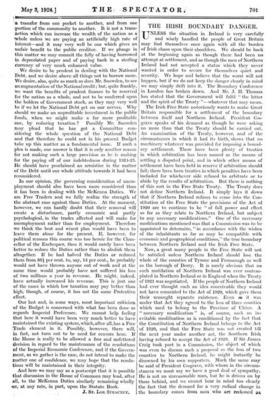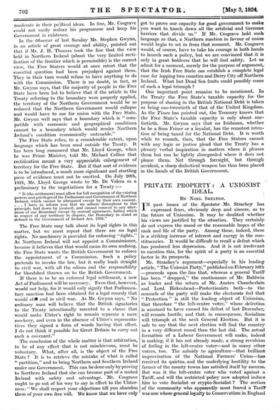THE IRISH BOUNDARY DANGER.
TTNLESS the situation in Ireland is very carefully lJJ and wisely handled the people of Great Britain may find themselves once again • with all the burden of Irish chaos upon their shoulders. We should be back at the beginning again as though there had been no attempt at settlement, and as though the men of Northern Ireland had not accepted a status which they never wanted in order to secure for themselves quiet and security. We hope and believe that the worst will not happen, but if we do not keep the danger clearly in mind we may simply drift into it. The Boundary Conference in London has broken down. And Mr. J. H. Thomas has stated that the Government will fulfil " the letter and the spirit of the Treaty "—whatever that may mean.
The Irish Free State notoriously wants to make Great Britain responsible for a settlement of the boundary between itself and Northern Ireland. President Cos- grave speaks of his demand as though he were asking no more than that the Treaty should be carried out. An examination of the Treaty, however, and of the circumstances in which it had its birth, shows that no machinery whatever was provided for imposing a bound- ary settlement. There have been plenty of treaties in which arbitration has been named as the means of settling a disputed point, and in which other means of settlement have been held in reserve if arbitration should fail; there have been treaties in which penalties have been included for whichever side refused to arbitrate or to abide by the results of arbitration. But there is nothing of this sort in the Free State Treaty. The Treaty does not define Northern Ireland. It simply lays it down that if Northern Ireland refuses to come into the Con- stitution of the Free State the provisions of the Act of 1920 are to continue to be " of full power and effect so far as they relate to Northern Ireland, but subject to any necessary modifications." One of the necessary modifications mentioned was that a Commission was to be appointed to determine, "in accordance with the wishes of the inhabitants so far as may be compatible with economic and geographical conditions," the true boundary between Northern Ireland and the Irish Free State. Now, a great many people in the Free State will not be satisfied unless Northern Ireland should lose the whole of the counties of Tyrone and Fermanagh as well as the borough of Derry. It is surely obvious that no such mutilation of Northern Ireland was ever contem- plated in Northern Ireland or in England when the Treaty of 1921 was negotiated, v If the people of Northern Ireland had ever thought such an idea conceivable they would not have consented to the Act of 1920, which gave them their unsought separate existence. Even as it was under that Act they agreed to the loss of three counties which used to belong to the Province of Ulster. A " necessary modification " is, of course, such an in- evitable modification as is conditioned by the fact that the Constitution of Northern Ireland belongs to the Act of 1920, and that the Free State was not created till the next year under another act, the Southern Irish, having refused to accept the Act of 1920. If Sir James Craig took part in a Commission, the object of which was even to discuss such a proposal as the loss of two counties to Northern Ireland, he might instantly be disowned by his own supporters. Much the same may be said of President Cosgrave, with whom in the circum- stances we must say we have a good deal of sympathy. He is not an unreasonable man, but he is driven on by those behind, and we cannot bear in mind too clearly the fact that the demand for a very radical change in the boundary comes from men who are reckoned 41,4„ moderate in their political ideas. In fine, Mr. Cosgrave could not easily reduce his programme and keep his Government in existence,.
In the Observer of last Sunday Mr. Stephen Gwynn, in an article of great courage and ability, pointed out that if Mr. J. H. Thomas took the line that the view held in Northern Ireland (about the very limited recti- fication of the frontier which is permissible) is the correct view, the Free Staters would at once retort that the essential question had been prejudged against them. They in their turn would refuse to have anything to do with the Commission. There is no doubt, in fact, as Mr. Gwynn says, that the majority of people in the Free State have been led to believe that if the article in the Treaty referring to the boundary were properly applied, the territory of the Northern Government would be so reduced that the Northern Government would collapse and would have to sue for union with the Free State. Mr. Gwynn well says that a boundary which is " com- patible with economic and geographical conditions cannot be a boundary which would render Northern Ireland's condition economically untenable."
The Free State relies, to a considerable extent, upon language which has been used outside the Treaty. It has been long rumoured that Mr. Lloyd George, when he was Prime Minister, told Mr. Michael Collins that rectification meant a very appreciable enlargement of territory for the Free State. But if that sort of evidence is to be introduced, a much more significant and startling piece of evidence must not be omitted. On July 20th, 1921, Mr. Lloyd George wrote to Mr. De Valera as a preliminary to the negotiations for a Treaty :— " It (the settlement) must allow for full recognition of the existing powers and privileges of the Parliament and Government of Northern Ireland, which cannot be abrogated except by their own consent. . . . I have to inform you that we adhere throughout to this principle, laid down by yourself, and cannot consent to any alter. ation of our Boundary except by mutual agreement, failing which in respect of any territory in dispute, the Boundary to stand as defined in the Government of Ireland Act, 1920."
The Free State may talk about its legal rights in this matter, but we must repeat that there are no legal rights. No machinery is provided for enforcing "rights." As Northern Ireland will not appoint a Commissioner, because it believes that that would mean its own undoing, the Free State wants the British Government to enforce the appointment of a- Commission. Such a policy pretends to invoke the law, but it really leads straight to civil war, with all the odium and the responsibility for bloodshed thrown on to the British Government.
If there is to be an enforced legal settlement, a new Act of Parliament will be necessary. Even that, however, would not help, for it would only signify that Parliamen- tary sanction had been obtained for a legal remedy that would stiff end in civil war. As Mr. Gwynn says, " No ordinary man will believe that the British signatories to the Treaty intentionally assented to a clause that would make Ulster's right to remain separate a mere mockery, and even in the absence of Ulster's representa- tives they signed a form of words having that effect. I do not think it possible for Great Britain to carry out such a covenant."
The conclusion of the whole matter is that arbitration, to be of any effect that is not mischievous, must be voluntary. What, after all, is the object of the Free State ? It is to retrieve the mistake of what is called. " partition," and to bring Northern and Southern Ireland under one Government. This can be done only by proving to Northern Ireland that she can become part of a united Ireland with safety and advantage. 'Mr. Cosgrove ought to go out of his way to say in effect to the Ulster- men: "We shall respect your objections till you abandon them of your own free will. We know that we have only to prove, our capacity for good government to make you want to knock down all the artificial and tiresome barriers that divide us." If Mr. Cosgrave held such language as that, a Northern reaction in favour of union. would begin to set in from that moment. Mr. Cosgrave would, of course, have to take his courage in both hands to launch such a policy, but we are convinced that it is only in great boldness that he will- find safety. Let us admit for a moment, merely for the purpose of argument, that the Irish Free State can establish a complete legal case for lopping two counties and Derry City off Northern Ireland. What but Dead Sea fruits could possibly come of such a legal triumph ?
One important point remains to be mentioned. In the Treaty the Free State's taxable capacity for the purpose of sharing in the British National Debt is taken as being one-twentieth of that of the United Kingdom. As the Times has pointed out, the Treasury knows that the Free State's taxable capacity is only about one- fortieth. Mr. Gwynn says that no Irishman, whether. he be a Sinn Feiner or a loyalist, has the remotest inten- tion of being taxed for the National Debt. It is worth while to remark, then, that the Free Staters cannot with any logic or justice plead that the Treaty has a plenary verbal inspiration in matters where it pleases them but can be lightly disregarded where it does not please them. Not through foresight, but through. accident, a sharp dialectical weapon has thus been placed' in the hands of the British Government.















































 Previous page
Previous page